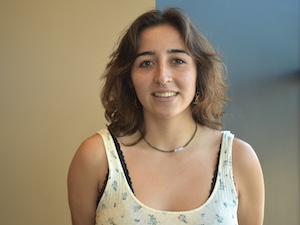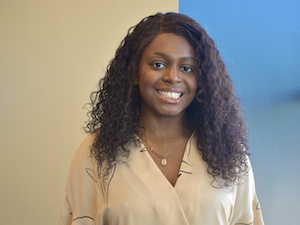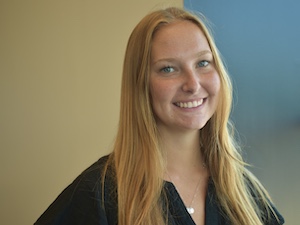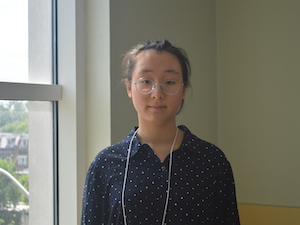2022 Week 2: Healthcare
Fatima Baloul | Shepherd’s Clinic
Throughout the week, I developed a daily rhythm and routine at Shepherd’s Clinic, and through that I felt immensely more comfortable and productive in my position as an Intern. Amid a hectic morning, I complete reminder calls — to remind patients of their upcoming appointments — screen patients, check patients in, and as the patient leaves, I generally provide them with boxes of food from our pantry if needed. However, as I had the opportunity to speak with our patients each day over the week, I truly was appalled by the health inequities they experience, and in that, I recognized the advantages I have as a Hopkins student. From a patient that experiences homelessness and food scarcity, to an individual that is Spanish – speaking and unable to access quality healthcare prior to being a patient at Shepherd’s Clinic, I understand at least a portion of their hardships, yet, in the face of such adversity, they are so incredibly gracious and thankful. Nonetheless, it is reassuring to observe the ways in which the clinic operates to assist these individuals, whether that be providing transportation to and from medical visits, supplying patients with food from our pantry as well as personal hygiene products, and a translation system so that no patient experiences language barriers at the clinic. I especially love the connection between Shepherd’s Clinic and the Joy Wellness Center. Joy Wellness is an extension of Shepherd’s Clinic that provides integrative health care. In addition to medical services at Shepherd’s Clinic, the Joy Wellness Center offers meditation, yoga, acupuncture, nutritional programs, etc. at no cost to improve the mental and emotional wellbeing of our patients and the community.
 Emma Bocanegra | Esperanza Center
Emma Bocanegra | Esperanza Center
This second week of being at the Esperanza Center has gone by very quickly. I have been reflecting a lot about how grateful I am to have been placed here to meet and learn from all the people who work here and gain such an intimate firsthand knowledge of the barriers uninsured people face in trying to get healthcare. The overturning of Roe v. Wade last Friday made me think a lot about healthcare access in the United States. There have been many moments since I found out about that Supreme Court decision that I felt a lot of hopelessness and despair, and there were many times before that decision as well when the issues that the US faces regarding health disparities were so rooted in our history, institutions, and culture, that pursuing a career in public health felt like condemning myself to a life of frustration and dissatisfaction. However, spending time at my internship and getting to know my colleagues has been the opposite of a motivation drain. Even after reading terrifying headline after terrifying headline the last few days, I’ve felt comforted and inspired by the people I work with. They’re all so supportive and driven to do good work and serve the community without any ego or self interest. Being reminded that there are so many people in the world like the ones at the Esperanza Center to outweigh politicians being driven by their own greed and power hunger has been a true comfort and relief.
I expected that the devastation that the overturning of Roe v. Wade caused would be debilitating, and make me feel powerless to make lasting change in the world. However, interacting with patients at the Esperanza Center, scheduling their appointments and communicating with them about whatever steps they need to do next to utilize the resources of the Esperanza Center has been very meaningful ad motivating to keep working and using my privileges to support and serve other people. Because even if something terrible happens (like Roe v. Wade being overturned), I’ve seen how even simple small tasks that only affect one person (like making a phone call to a doctor who only speaks English for a patient who only speaks Spanish) can make a tremendous difference for someone.
 Dumebi Nwankwo | MOMCares
Dumebi Nwankwo | MOMCares
The art of self-sufficiency has been a very interesting adjustment for me. Throughout the past few years, I’ve had an annoying amount of zoom classes. For me, the remote nature was never the issue. What became a problem was whenwork I needed to complete became primarily asynchronous. At my placement, at least for the first month, this seems to be the case. A lot of my work is very task heavy. The expectation is to work independently, but at the end of the week produce the necessary results. Although I like this system, I find myself having trouble starting my day on time on those remote days. I feel like there has been a weird amount of freedom that I’ve now acquired. This freedom makes me feel as if I’m able to get up at 10 am, and start work at 11 am, rather than starting my day earlier so I can get done earlier. The mindset that “I just need to complete the tasks” messes up work-life balance for me. I find myself doing certain tasks in the evening after I’ve already decided that I’m done working for the day. I don’t think I’m getting too much work, however I do think I would benefit from more structure. That’s why this has been hard for me to adjust to. This is probably just something that comes with adulthood, but I’m working on giving myself a much needed schedule.
 Stacey Tang | Healthcare for the Homeless
Stacey Tang | Healthcare for the Homeless
This week was exciting because I got to visit the office for the first time on Thursday! Being in-person was not only fun but also extremely insightful because it allowed me to really contextualize all of the work HCH does and obtain a better understanding of the role of all the staff at the organization. What surprised me the most was how big the behavioral health department was; the services covered in the department includes (but is not limited to!) housing services, addiction services, and psychiatric care so there were staff on all three floors of the building!
A large portion of the work I am doing centers around racial equity and inclusion so while in the office, I attended a webinar on microaggressions and unconscious and racial biases. The training touched on a lot of things we discussed during orientation such as the concept of intersectionality, how it is important to consider the privileges and powers we may hold in some spheres and not in others, and how that might impact one’s access to and experiences in healthcare. The presenter introduced this idea of “decolonizing healthcare”, which is the idea that we must dismantle the structures, policies and narratives that allow for the racial injustice and health inequities we see today. Because I do not work directly in healthcare, it was really surprising to learn just how much race impacts how healthcare workers are treated and especially when working with vulnerable populations like those facing homelessness, it is important to be cognizant of the biases that often arise in healthcare because of the difference in race between provider and patient. While I was debriefing on this webinar with my supervisor, we were able to not only talk about things like how aspects of our identity clash and coincide, but also about what it means to truly be an ally, the challenges of serving those experiencing homelessness, and strategies that my supervisor personally uses to ensure that patients feel heard and valued.
One of the strategies my supervisor uses is motivational interviewing, a competency that I am in charge of creating a presentation for. I have never heard of motivational interviewing prior to Thursday, but it seems like a strategy that would be useful even if one doesn’t end up working in healthcare. Motivational interviewing is the idea of conversing with clients in such a way that clients are self motivated to enact change in their life to promote well-being instead of the provider pushing changes to the client’s life without much consideration to the unique circumstances of each client. One large aspect of this is asking patients questions about their life rather than assuming, something that my supervisor mentioned also remedies common challenges when serving communities such as saviorism, or disconnect between volunteers and the group they serve. Working on the presentation has definitely been challenging, especially because this presentation is intended for those already knowledgeable about motivational interviewing while I do not have much knowledge or experience with the topic. In the coming weeks, I will definitely see where I can try motivational interviewing in my own life and reflect on that experience as well!
 Teagan Toomre | Keswick Multi-Care Center
Teagan Toomre | Keswick Multi-Care Center
One challenge I’ve been dealing with this week is balancing long-term projects and short-term tasks. I’ve been assigned a few projects that will span the whole summer, some of which are long, time-intensive projects, and some of which are relatively quick projects that I have all summer to do. Even with my not-exactly-stellar record when it comes to procrastination, I wouldn’t foresee any problems completing these long-term projects, especially because I’m actually pretty excited about a few of them!
However, where I’m struggling more is that on top of these summer-long projects, there are also lots of day-to-day meetings and little tasks to complete. Especially in a clinical environment, there’s always a resident to be helped or simply to have a conversation with, so the list of potential things to do is literally endless. It’s not that I actually have an overwhelming amount of work that I can’t get it all done, but I’m struggling to manage long-term mandatory tasks with short-term optional ones. It’s tough to balance being available enough for little tasks that pop up while also making progress chipping away at the long projects.
I think this is one of the challenges of any in-person workplace; you often get pulled away from things you’re working on for conversations, assistance with other people’s projects, or just random distractions. This is something that I’m not all that used to. At school, even in person, time is usually pretty delineated; you focus on class during class time, and the rest of the time is yours to delegate between homework, extracurriculars, and personal things. Rarely am I operating in a place where my time essentially belongs to someone else and I can be asked to do anything at the drop of a hat and expected to be available. I’m glad to have this experience, though, as I think it’s pretty similar to any fast-paced dynamic work environment I might be expected to find myself in one day.
 Sellina Yoo | MERIT
Sellina Yoo | MERIT
One challenge I’ve been facing this week is working individually. I think because I am a student, and have been almost all my life, it’s very difficult for me to start to take action without a little bit of coaxing or guidance from my teachers and/or professors. Whether this be through assignments, exams, or even just class meetings, I always feel like someone is checking my progress. However, MERIT works with deliverables, which is where each intern has a list of tasks with respective deadlines, and each intern is left alone to work as they please as long as they complete the tasks by each deadline. I thought this would be really great at the beginning, but I began to panic around mid-week when I realized that there is a lot of trust given to me to get these tasks done. It wasn’t time management that I struggled with, but rather just the idea of being unsupervised with my work for the first time. It was quite scary and overwhelming at first, but I managed my time well and completed my tasks on time. Another challenge was leading a classroom for the first time and prepping for it, like creating lesson plans, homework, a syllabus, and setting up a learning platform. I found this to be difficult because I had never led a class before (but have assisted), but I overcame this by communicating with my co-teacher and dividing roles so that we each had breaks and didn’t get too stressed. I also really do enjoy creating my own lessons, and I’m excited to see what the students think of them. I didn’t have any trouble adjusting between remote and in-person work (which I’m currently both doing), but this could be because I’m used to juggling both in-person and remote classes after two semesters of doing so.
